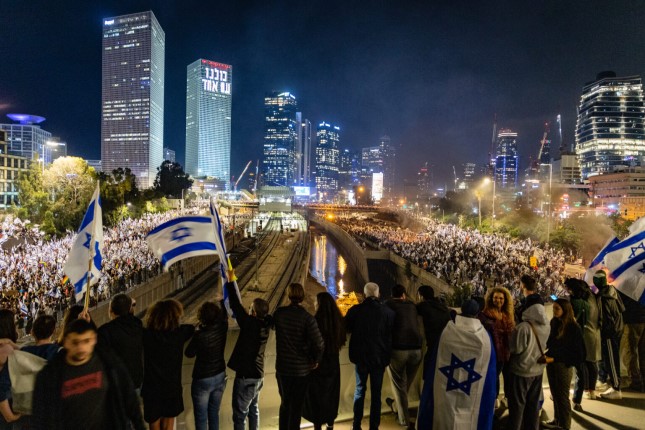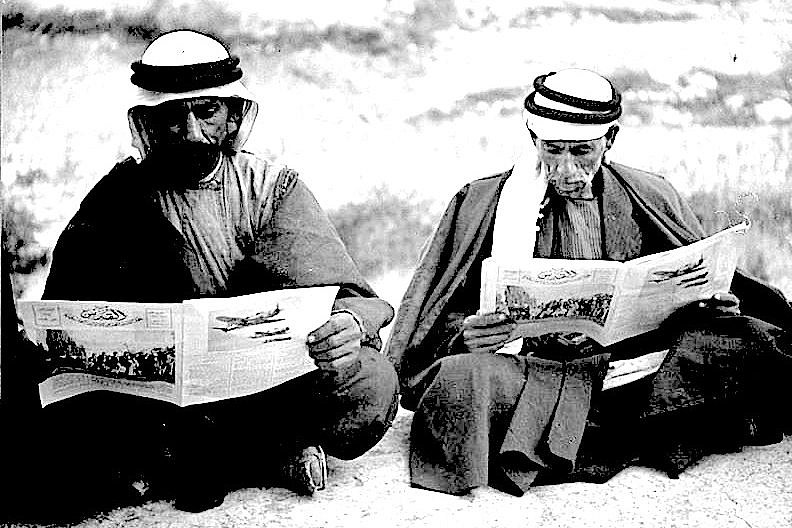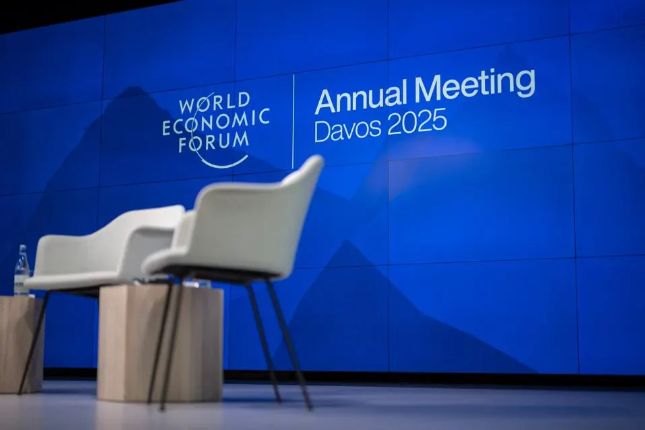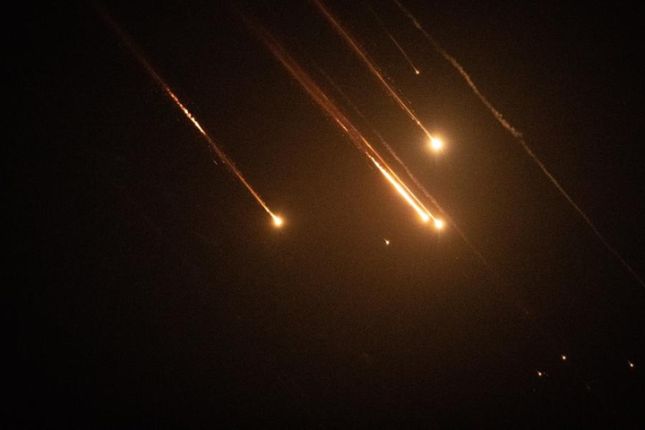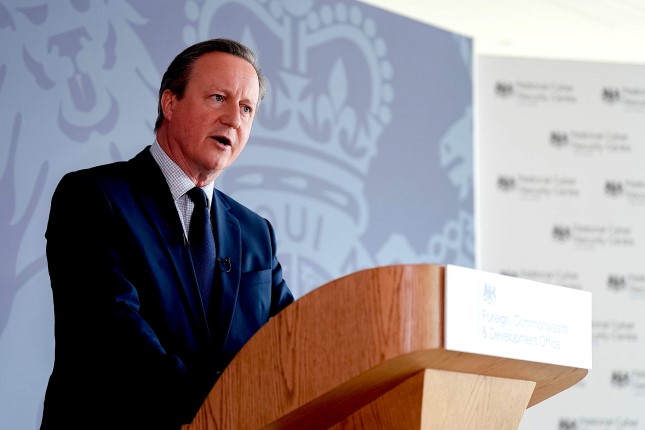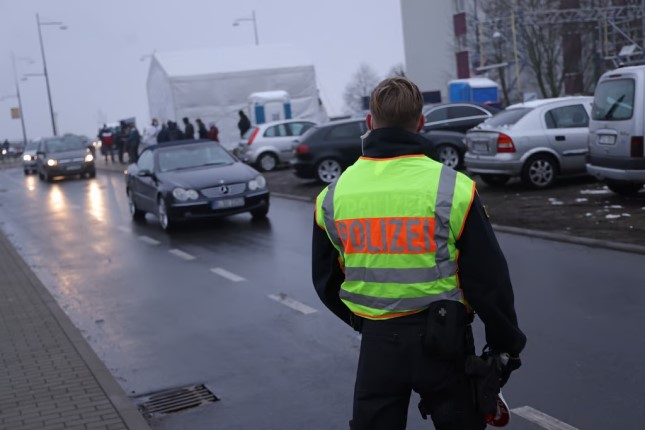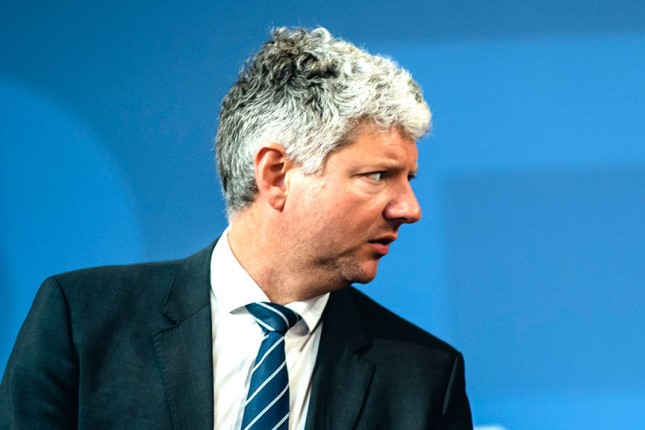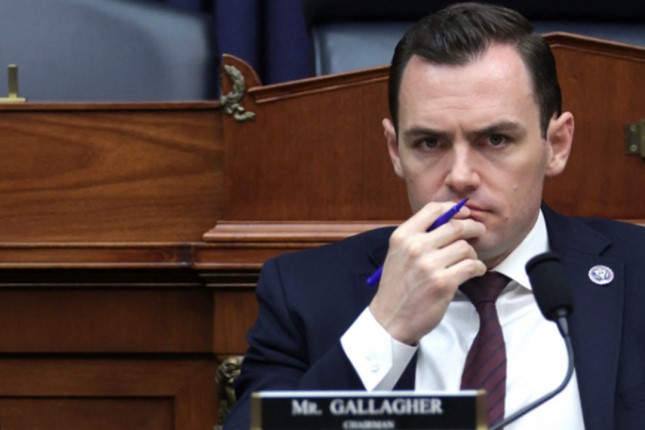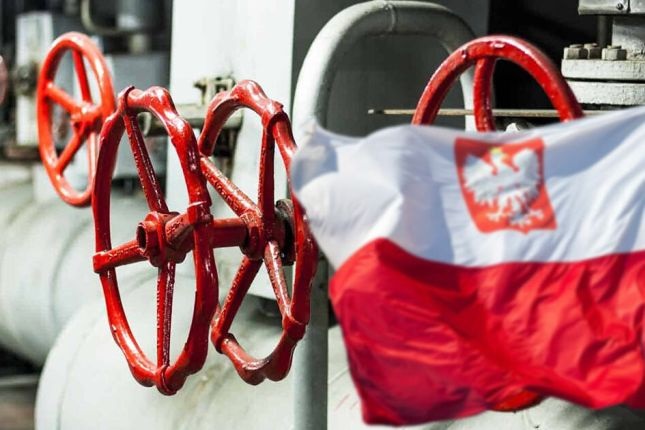Israeli protests have attracted wide coverage in Western media, which has been largely and blatantly laudatory. The aim of Western liberals is linked to Israeli opponents of Prime Minister Benjamin Netanyahu – to unseat Likud from power.
But the protests reveal only a partial picture of Israeli politics and society because, since 1948, Western media has downplayed the existence of non-liberal and religious Israelis, especially those who do not descend from Europe. Israeli writer Amos Oz famously blamed the rise of Likud after 1977 on the demography of Jews from Middle East countries, which weakened European Jews’ continued dominance of Israeli politics.
Western media, and even some Arab media, like the Saudi mouthpiece, Ash-Sharq Al-Awsat, lambasted Palestinians and Arabs for not showing support and even interest in the Israeli protest movement. It is true the Palestinians, and Arabs in general, have largely reacted apathetically to recent Israeli domestic events. The protests have been over a bill, now passed by the Knesset, which would weaken the power of Israeli courts.
Western liberals count on the judiciary in Israel to basically save Israel from the repercussions of the changing political orientations among Israeli Jews. By contrast, Western liberals have never shown much interest or concern over the unequal status of Arabs inside 1948 Palestine or in the occupied territories of 1967. For them the issue of justice and fairness can only be measured as it relates to the Jews of Israel — not to the Arabs. And from that perspective the role of the Israeli judiciary becomes important because it can save Israel from the impact of the electoral changes in the body politics where the Labor Party no longer plays any significant role.
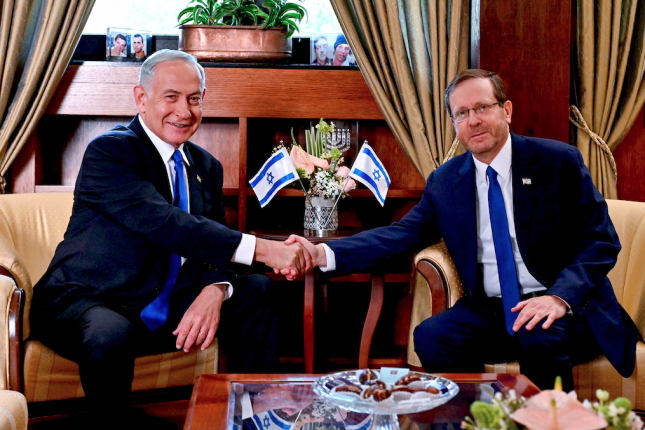
Israeli President Isaac Herzog, on right, with assigns task of forming a new government to Likud Party leader, Benjamin Netanyahu, Nov. 13, 2022. Photo: Kobi Gideon / Government Press Office / CC BY-SA 3.0 / Wikimedia Commons / CC BY-SA 3.0.
The divide in Israel today is not between right and left; it is between right and far right, between those who want to repress the Palestinians and those who want to repress the Palestinians even more. It is between those who want to continue the bombing campaigns of Palestinian homes and those who want to continue and expand the bombing campaigns of Palestinian homes. For that, reason it is understandable that the Arabs regard the protests as irrelevant to their lives.
The debate in Israel today is exclusively focused on how political changes will affect various segments of Israeli Jews; it has nothing to do with Arabs it has nothing to do with the institutionalized unequal status of the Arabs inside 1948 Palestine. And the protesters, while angry at Netanyahu and Likud, are not pressing the government on matters related to repression and murder of Arabs.
Israeli protesters object to the “positive discrimination” in favor of religious Israeli Jews (who get exemptions from military service and get to exercise control of their curricula) but don’t object in the least against the negative discrimination suffered by Palestinians since the founding of the state.
Furthermore, as the debate in Israel focuses on the role of the Supreme Court, Arabs themselves have been victims of the Israeli judiciary in the same way they have been a victim of the Israeli army and Israeli political institutions. All elements of the Israeli government have been consistently responsible for the denigration and the subjugation of Palestinians, both inside 1948 Palestine and in the so-called occupied territories (a reference to Palestinian territories occupied since 1967).
The Israeli judiciary only rarely and cosmetically object to some excesses of the Israeli army. But overall the racism and the apartheid nature of the state, and the continuous mass violence by the Israeli army on Palestinians, have been legitimized and approved by the Israeli judiciary, regardless of whether there is a token Arab member on this court or that Israeli court.
Institutionalized Racism & Inequality
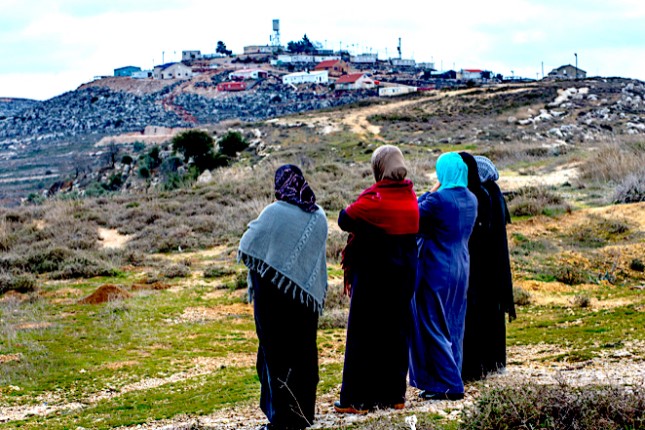
Palestinian women looking up at an illegal Israeli outpost in the West Bank village of Jalud in 2017. Photo: EU Civil Protection and Humanitarian Aid / Flickr / CC-BY-NC-ND 2.0.
Israel is a state based on institutionalized racism and inequality and all arms of the state are equally culpable in the repression of the Palestinians. The notion that we need the Israeli judiciary in order to save Israeli democracy is true only in the sense that Western liberals associate Israeli democracy with the dominance by European Jews in Israel.
It is not about whether the Israeli judiciary is going in any way to limit the violent deeds and the racist legislations of the Israeli legislative and executive branches. The debate going on about the judiciary is a Zionist debate through and through and does not, and should not, concern Arabs in the least.
The different outlooks between Western media and commentators and the Arab public regarding the protests stem from divergent assessments of the nature of the Israeli political system. Western governments and media have regarded Israel since 1948 as a full-fledged democracy with which Western powers share values — whatever that means.
Western governments never regarded the mistreatment and denigration of Arabs by Israel within “its borders” as contradictory to the democratic promise of the state and to its glowingly lofty Declaration of Independence (how obvious is the propaganda of the Israeli “founding fathers” that they had a Declaration of Independence very much like the Declaration by the American founding fathers).
It is very much like Western powers having had no qualms about doing business with apartheid South Africa because the oppressed race was regarded by whites in the West as being inferior. Similarly, Westerners do not regard the oppression of the Palestinians as a problem for the classification of the Israeli political system. As long as there is a democracy for Jewish citizens (who are regarded as Westerners even though many of them came from Asian and African countries) the conditions and the fulfillment of democratic promise was achieved, as far as the West is concerned.
Furthermore, the European ancestry of Israeli leaders, since the founding, has made Israel far more attractive to Europeans and Americans — on ethnic grounds.
Colonial Settler State
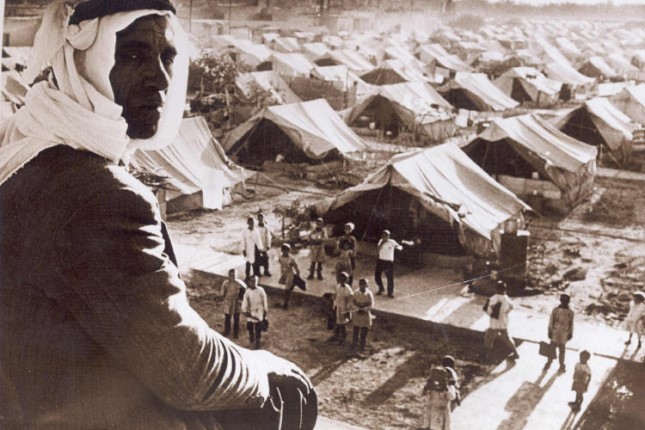
Jaramana Refugee Camp in Damascus, Syria, established after the Palestinian Catastrophe, or Nakba, 1948. Photo: Public domain / Wikimedia Commons.
In the Arab world, people have never bought that Israel was or is a democracy. The state was — and is – regarded as a colonial-settler state that established a Jewish supremacist state atop an existing Palestinian nation. Discrimination against non-Jews is built in into the fabric of state and society (and was established in the Balfour Declaration of 1917). There is no aspect within that state that doesn’t carry within it elements of discrimination and racism. So the debate that we need to be concerned about saving Israeli democracy is salient only to those who have regarded Israel as a democracy in the first place — which does not apply to Arabs.
Israel is a democracy insofar as all governments that are subservient to U.S. and Western interests are accorded a special elevated status of political classification. Thus all Gulf dictatorships have not been treated as dictatorships by Western countries for the last many decades.
American media insistence on looking at Israel as a mirror copy of the U.S. political system is revealed by their recent references to the need for the separation of powers in Israel. In reality, the Israeli political system is not a presidential system like the U.S. It is a parliamentary system where there is no principle of separation of powers, not to mention that Israel doesn’t even have a written constitution but a collection of basic laws that form a guiding (practical) constitution of sorts.
There was a time when PLO leader Yasser Arafat and his cronies would await the results of Israeli elections with great anticipation hoping that the Labor Party would win and would make peace with the Palestinians. There was a time when Palestinian organizations, such as the leftist Democratic Front for the Liberation of Palestine, would issue declarative statements expressing solidarity with what used to be called the “Israeli peace camp.” All these calls meant nothing to the Palestinians who could not relate to the discourse and agenda of various Israeli groups.
The Labor Party sometimes today barely wins a seat in Israeli elections and there is no self-declared peace camp in Israel any more – assuming there ever was. All the debates in Israel are about the Jewish segment of the population, not about the native inhabitants of historic Palestine. Current Israeli parties never made an attempt to relate the issue of occupation and injustice to their own protests, which have been exclusively focused on intra Jewish debates. Sometimes protesters who chant against occupation or who hold Palestinian flags are expelled or beaten.
Arabs who are watching the protests could not but notice the peaceful and gentle treatment of protesters by Israeli police. They contrast to the live ammunition that has been deployed against Arab protesters in the “occupied territories” of 1967 and also inside what is called in Western media, “Israel proper.” The very racism of the state is exposed in the Israeli state management of the protests.
It is for those reasons that Arabs are not following the protests with any interest because they know that the Palestinians will be occupied, repressed, and murdered regardless of the outcome of the internal struggle in Israel.
Main photo: Protesters again judicial reforms block Ayalon Highway in Tel Aviv on March 26 © Oren Rozen / Wikimedia Commons / CC BY-SA 4.0.
Source: Consortium News.
